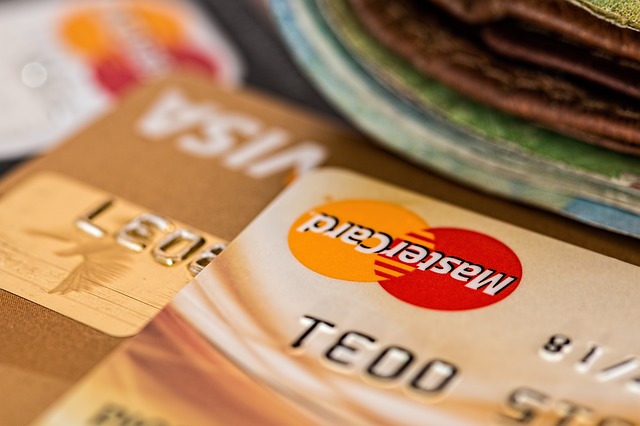What Is Credit?
“Credit” is when you have the ability to use borrowed money. This can come in many different forms, from credit cards to mortgages. There is a wide range of ways to use credit, which means that it is often a challenge for beginners to learn all the different ins and outs of using credit.
Basic Credit Terms
Before diving in to how each piece works together, you should know some of the basic terms that come up a lot with credit.
Principle
This is the amount of money that you need to re-pay. This includes the amount you originally borrowed, plus any extra interest.
Interest Rate
This is how much you are charged for the right to use borrowed money. This is an annual interest rate.
Credit Limit
Your credit limit is the total amount you are allowed to borrow.
Grace Period
This is the time between when you borrow money and when interest begins to be charged on the principle.
Minimum Payment
This is the least amount you can pay back per month before your credit card company considers you defaulting on your debt. This is a percentage of your total principle balance.
How Does Credit Work?
 Credit works based on trust. You, as the borrower, ask a lender for a “line of credit”, or the ability to borrow money to use for your own needs, and you promise to pay it back. The lender will agree, with certain terms and conditions. These terms are generally based on what you intend to buy, how likely you are to make all repayments on time, how trustworthy you have proven yourself in the past with borrowed money, your income, the overall conditions of the market, and a few other factors.
Credit works based on trust. You, as the borrower, ask a lender for a “line of credit”, or the ability to borrow money to use for your own needs, and you promise to pay it back. The lender will agree, with certain terms and conditions. These terms are generally based on what you intend to buy, how likely you are to make all repayments on time, how trustworthy you have proven yourself in the past with borrowed money, your income, the overall conditions of the market, and a few other factors.
At the end of the day, the more trustworthy you have proven yourself to creditors, the better terms you can get when borrowing money, because they see it as a lower risk. If creditors do not see any reason to think you’re trustworthy (or if you have proven yourself untrustworthy in the past), you will get worse terms.
What Are My Credit Terms?
Your credit terms refers to how much you can borrow, and how expensive it is to borrow. Having “Good Terms” generally means higher credit limits (meaning you’re allowed to borrow more money at a time), lower interest rates (making it less expensive to borrow), and other perks like cash back and flight miles. For beginners, focusing on lower interest rates should be your biggest concern when shopping around for credit cards or car loans.
How Can I Improve My Terms?
Since your credit terms are determined by trust, the best way to improve your terms are by using credit and reliably paying it back. This shows creditors that you are able to manage regular payments and will very likely be able to pay back your borrowed money on.
From a creditor’s point of view, every time they lend money it is an investment. Their return on investment would be the interest rate you are charged to borrow money, while their risk is the likelihood you are not able to pay back on time, or not at all. If you have shown that you can reliably make your payments, they believe you’re a safer investment, and so you get better terms. If they don’t have much credit history, or (worse) a credit history with lots of late or missed payments, they see you as riskier, so they charge more to use the service.
Creditors use credit reports to share information with each other about who does, and who does not, pay their bills, so you won’t be able to get out of a bad credit history by switching to a different lender.
Credit In Practice – A Credit Card
When you use your credit card to buy something, say a television at $300, you open a new principle balance for $300, which you borrow from the credit card company. You can only borrow up to your Credit Limit, we will assume your credit limit is $300 in this example so the TV used it all up.
The credit card company then gives you a Grace Period, or time between when you first make the purchase and when they start charging you Interest. The grace period is usually 3-4 weeks, but this can vary a lot depending on your credit card company [rich]The Grace Period is another important term to know when shopping between credit card companies![/rich]
After the Grace Period ends, the credit card company will start charging you an Interest Rate. The interest rate is a percentage of the principle balance that is added as a charge – this is the primary cost of borrowing money. The Interest Charge is added to your Principle Balance.
You will need to make at least your Minimum Payment every month in order to remain in good standing with the credit card company. The minimum payment is a percentage of the Principle Balance, but beware – if your minimum payments are less than the amount being added by interest and fees, you will never fully pay off your debt. Many young people have been stuck paying off relatively small credit card debts for many years by only making the minimum payments, meaning they ended up paying many times extra in interest more than they originally borrowed! You can always pay more than the minimum payment.
As you make payments to reduce your principle balance, you can use the difference between your principle balance and your credit limit to continue making extra purchases on your credit card.
Once your principle balance is zero, no more interest will be charged, and you will be back to the beginning. To see how this works out, check out our Credit Card Payments Calculator.
Credit In Practice – A Mortgage
 If you need to buy a house or property, you will have a mortgage. The biggest difference between a mortgage and a credit card is that with a mortgage, you are borrowing the money for a very specific purpose, usually to buy a house. The house you are buying then becomes collateral in the loan, meaning that if you fail to pay back, the creditor can take your house.
If you need to buy a house or property, you will have a mortgage. The biggest difference between a mortgage and a credit card is that with a mortgage, you are borrowing the money for a very specific purpose, usually to buy a house. The house you are buying then becomes collateral in the loan, meaning that if you fail to pay back, the creditor can take your house.
This risk of losing your house works both ways – it also means that your creditor has a lot lower risk in lending you the money, since they are able to claim something back if you aren’t able to repay. This means that with a mortgage, you will have much higher credit limits and better interest rates than a credit card, even with the same credit score and credit history.
Otherwise most of the mechanics are the same as a credit card – minimum payments, interest and principle all work the same.
Unlike credit cards, there are two types of interest rates used with mortgages, Adjustable and Fixed.
Fixed-Rate Mortgages
Fixed-Rate mortgage is how it sounds, the mortgage interest rate is fixed for the entire duration of the mortgage. This means your rates and payments will be predictable for the entire duration of the mortgage. As a trade-off, fixed-rate mortgages might be (on average) slightly higher than adjustable.
Adjustable-Rate Mortgages
With an adjustable-rate mortgage, your interest rate can move up and down over the term of your mortgage based on the overall market rates. Lenders prefer these – it means they can increase or decrease how much they’re charging based on prevailing market rates.
For lenders, you lose some predictability in your payments. However, to compensate, banks generally offer lower average adjustable rates than fixed rates (but this may not always be the case).
What Else Impacts My Credit?
There are a lot of other factors besides your credit history that will impact your credit and payments. The biggest of these can be the “Extra fees”, or money credit card companies charge for using certain services. These can be tricky and add up fast.
[rich]The most common extra fee is to receive a paper statement in the mail rather than by email. You might also be charged a “service fee” even if you don’t use your card.[/rich] Fees vary widely, both in type and amount, between credit card companies, so should definitely be on your list of things to check when shopping around.
Other factors are more mundane, like your income and the general market. If you earn more money, you will likely have higher credit limits and lower interest rates, since creditors see that you have a greater ability to pay. If interest rates in the overall market are low or high, this will also play a significant role on the rates you get.
Another hidden cost could be your interest rate calculation. Some creditors will make one calculation per month, others will charge per day. These differences can make a big impact on how your payments work- if there are monthly calculations, you benefit by making a big payment once per month right before the calculation. If it is daily, you benefit most by making many smaller payments throughout the month.
Building Credit From Scratch
Watch this great video from Bank of America showing how to start building credit from scratch.
Pop Quiz!
[mlw_quizmaster quiz=69]

 What are Futures
What are Futures 1-04 Stocks
1-04 Stocks